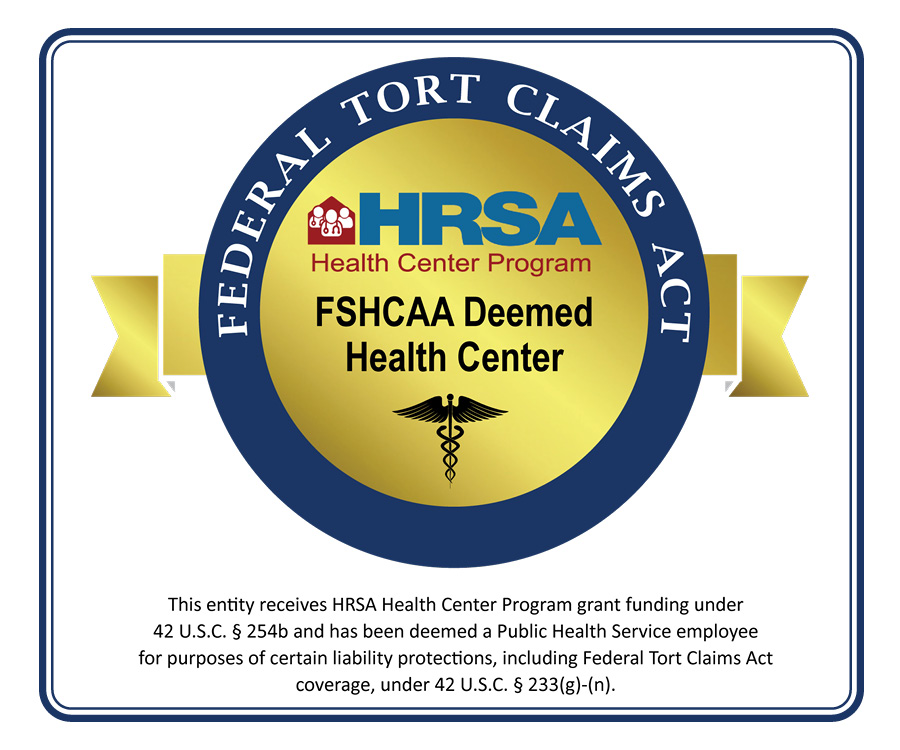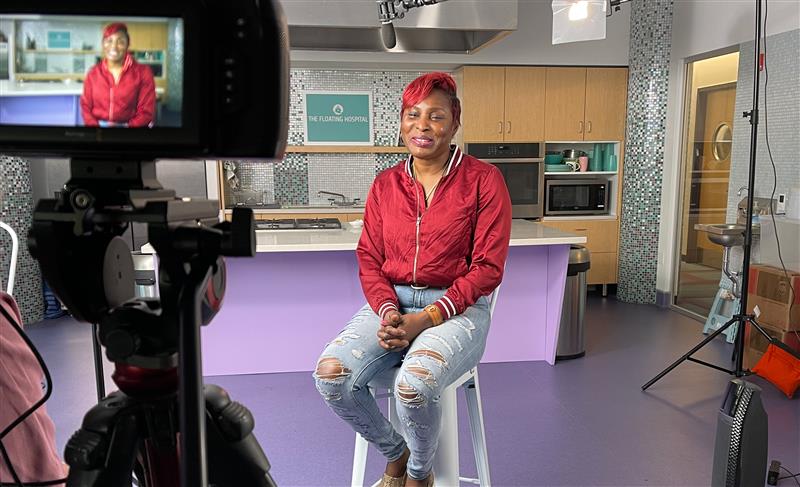
From homeless to progress: one patient’s story
It’s not uncommon for The Floating Hospital to maintain close ties with its patients—many are families who have trusted us with their wellbeing over the generations. And some help us inform our services and programming through their own journeys to good health and stability. Like Tameka Cooke, who spoke at our June fundraiser and told her story of courage and perseverance. Tameka was instrumental in telling us what moms like her need to transition from shelter living and onto a path of stability for her and her daughter. Thanks to her and the other patients who shared their experiences with us, and funding from a long-time supportive foundation, The Floating Hospital was able to launch a life-skills counseling program to help women with complex housing and insurance applications, school enrollments, and link up to supportive benefits. Here are excerpts from her story.
I came to this city four years ago, undocumented, and so sick that my friends could see death on me. My 12-year-old daughter came with me, both of us survivors of domestic abuse. We just came to get some relief, but I got sicker, then we were stranded and overstayed. It wasn’t my wish— being stranded, sick, homeless, no food, no benefits, no nothing.
It was a rough, rough time. We were two and half years in a homeless shelter and that’s where I found out about The Floating Hospital. Honestly, they’re my savior. They gave us transportation to get back and forth. It meant a lot because not only was I in the shelter, but I was also a cancer patient—very sick, very weak. So having that service come to me— because literally that’s what it does—they pick me up out of my room, they bring me here, then they bring me back home. That’s a big help because you know that you can get to the doctor, and you can get back home.
At the clinic, they treated us with dignity and respect. They didn’t ask us our status; they didn’t treat us any different from a person who was born here.
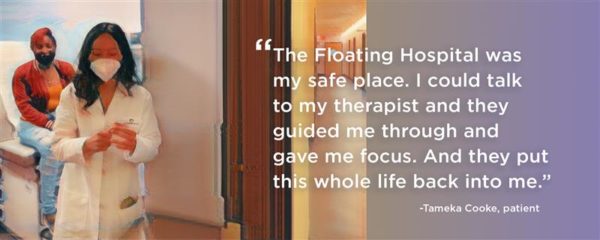
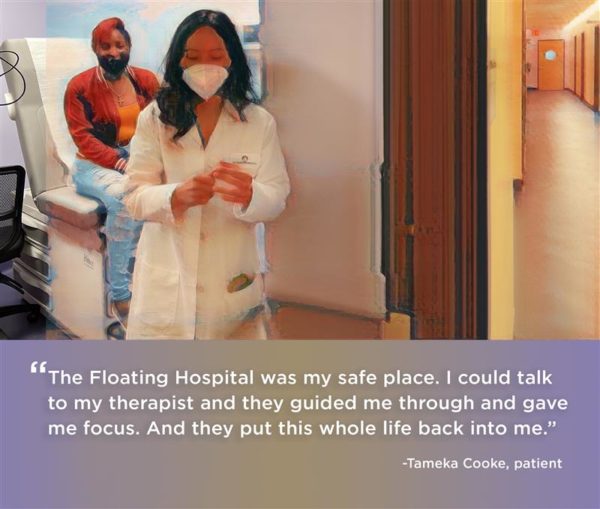
I have a rare adrenal cancer, so not much is known about it. So, I’m the living guinea pig. But coming to The Floating Hospital, my doctor didn’t shy away from not understanding my disease. She’s managed to seek out help outside when she needed more answers, refer me to other doctors, doctors connected with other doctors. And she helped me to find a team that worked for me.
The Floating Hospital was my safe place. I could talk to my therapist, and they guided me through and gave me focus. And they put this whole life back into me. They spoke strength into me. Here, we see the doctor, the dentist, the optician. We see the social worker, the life-skills department. We come there for referrals, the pharmacy, for everything.
[They] gave us a survey. They wanted to know what we wanted to see… things that we thought needed to change or new things that needed to come on stream.
I said if you really want to make the change, you have to listen to us… You have to hear what our problems are … for someone to not just hear us but help us figure it out and get the help that we need. We’re not asking for a full-service center, but we’re asking is for you to refer us to somewhere that can help us.
So, I was amazed they listened to us and created the life-skills department. I’m hoping that it could assist other persons to assimilate themselves, to become a part of the community through referrals to legal [immigration] services, educational services, learn about federal aid, how to get employment readiness programs…show people just how to function in New York City. It’s a big city with a lot of rules and regulations, and there’s so much to learn.
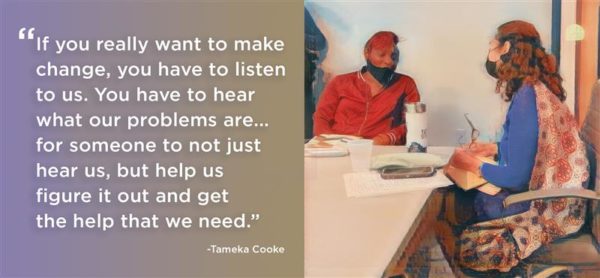
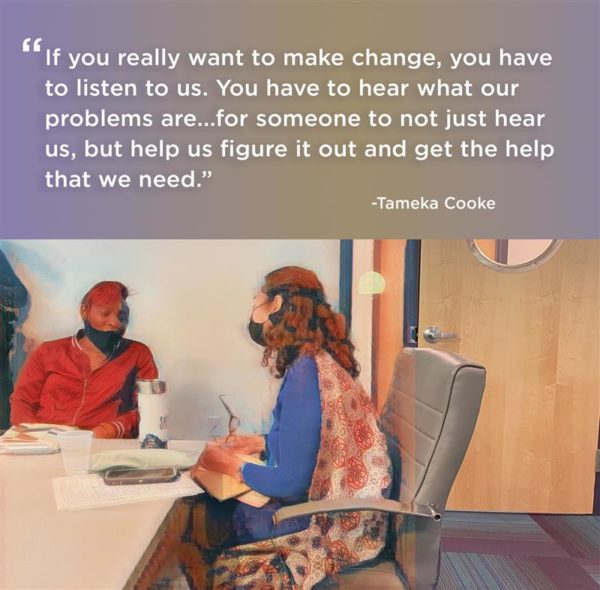
If you can give people these skills, you can uplift someone else and just keep the community growing. This has the power to reorient people back into society, and let them go back out, not as how they came, but bigger and better than how they were.
Everyone wants to get out of the shelter and with these resources, it’ll help them get out of the shelter and stay out of the shelter. These life skills are needed because no one wants to be homeless.
The life skill department has a big advantage, and this big advantage is connection. Persons who come here see how this service is changing their lives. They will tell people and more will come because homeless persons do not trust the system, but they trust The Floating Hospital. And that’s a big deal. Because when you trust someone, you will expose your vulnerability and they will be able to help you get to where you need to be.
I’m here to tell my story because so I can give back to The Floating Hospital because they gave to me. They gave to me when I didn’t even know I needed them, but they knew I needed them.
This post featured in our monthly newsletter from August 2022.
To get the latest from The Floating Hospital directly to your inbox, sign up using the form below. Other posts from this newsletter:
Share This Story, Choose Your Platform!
Categories
Tags
The Floating Hospital provides high-quality healthcare to anyone who needs it regardless of race, ethnicity, religion, gender, immigration or insurance status, or the ability to pay. By providing unrestricted medical care in tandem with health education and social support to vulnerable New York City families, The Floating Hospital aims to ensure those most in need have the ability to thrive, not just survive.


